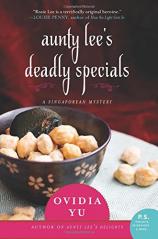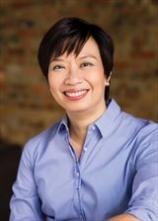Reading Group Guide
Discussion Questions
Aunty Lee's Deadly Specials: A Singaporean Mystery

1. Aunty Lee loves her kitchen, which is “small enough to get around quickly but there was space to fit in friends. She always felt that bonds formed while cooking together ran deeper than those formed merely eating together.” What role does cooking play in your friendships and family life? How do you think cooking together encourages bonding?
2. Aunty Lee likes buffets because she learns about people by watching how they pick items off the buffet table. What might your buffet approach say about you, to Aunty Lee’s sharp eye?
3. The traditional buah keluak dish ends up at the center of the whodunnit. Why does Aunty Lee continue to prepare such a labor-intensive dish, when many don’t seem to appreciate its intricacies?
4. Mabel Sung claims to hate Peranakan food in the novel, and it seems that sometimes a line is drawn between traditional, local fare like buah keluak and more modern. What does this say about Singaporean culture? What do the different characters reveal about themselves in the way they respond to Aunty Lee’s food?
5. Singapore’s strict social codes play a role in the novel, with many characters facing legal challenges to their relationships: Nina’s status as a foreign domestic worker, and Patrick Pang’s sexual orientation. How do the characters in AUNTY LEE’S DEADLY SPECIALS participate --- or not --- in these codes? What is Aunty Lee’s take on the matter?
6. There is a complex web of moral and legal issues around the illegal organ donor trade in the novel. Aunty Lee asks, “even if you have the organs, how does the law decide who gets them? It’s like playing God. Throw a dice, pick at random. As long as the people can pay.” Where do you think the members of the Never Say Die prayer and healing group would fall in this debate? Do you sympathize with Mabel Sung’s attempts to try to save her son --- even at the cost of another’s life?
7. Appearances are very important in the world of AUNTY LEE’S DEADLY SPECIALS, from displaying family income to “appropriate” clothes to surgically-enhanced or repaired bodies. Are appearances are deceptive? How does Aunty Lee use people’s need to maintain appearances to her advantage?
8. Among the shops at Bukit Timah Plaza are offices for travel and maid agencies, “full of frightened hopeful young women come to Singapore to work and waiting for potential employers to take their pick. They reminded Aunty Lee of desperate dogs in the adoption pound…Or worse, they made her think of the ‘live’ seafood in the tanks outside Chinese restaurants. Would anyone report a girl who ran away and died in a fire? Would anyone even miss her?”
9. Singapore’s underclass of undocumented workers plays a large role in the plot of AUNTY LEE’S DEADLY SPECIALS. How do the characters in the novel view these immigrants? How is this similar or different from the way immigrants are treated in your home country?
10. Despite their differences, Cherril and Mycroft are one of few examples in the novel of a happy couple, especially compared to Mark and Selina or the dysfunctional Sungs. Why does Aunty Lee think their relationship works? What made her own marriage with ML Lee so satisfying?
11. GraceFaith Ang, like Edmond Yong, is an unabashed social climber who cares only about her own success but it is her action that breaks the case wide open, while Edmond only digs deeper into his crimes. Why do you think GraceFaith gave Aunty Lee the documents and shut down the Sungs’ donor scheme? Was it her conscience? Or something else?
12. Healing through grief is a theme in the novel: Anne Peters walks her dog three times a day, while Aunty Lee stays busy, makes food and solves mysteries. Yet even cheerful Aunty Lee still grieves: “Now that loss was a permanent part of her life, she saw that the custom [of offering food to the dead] was less a matter of superstition than of wanting those you loved most to share your experiences.” Because she has experienced loss, she feels compassion for Patrick Pang after his partner’s death. Does your culture or family have customs around the grieving process? In what ways have you or those you know learned to heal?
13. Commissioner Raja confesses at the end of the book that he was worried the Sungs might kill Aunty Lee. She, of course, takes this as a cue to reflect on what food might be served at her funeral, saying: “We may offer food to remember the dead, but funerals and feasts are for the living…People must go on eating together to remind themselves why life is worth living.” Do you agree with Aunty Lee’s pragmatic outlook on life and death? What food would you have served at your funeral?








